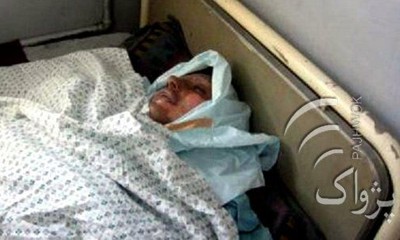On Line Opinion, June 6, 2008
Afghanistan: why a withdrawal of troops
Bombings are causing heavy civilian casualties as well as resentment in the Afghan population.
Marlene Obeid
The anti-war movement must step up its campaign for the immediate withdrawal of all troops from Afghanistan.
Although Australian sentiment is to see an end to any Australian involvement in the occupations of Iraq and Afghanistan, the Rudd Labor Government’s budget demonstrates its commitment to sustained increases in military funding to both occupations. The Australian Government’s excuses are that Australian troops are aiding in “reconstruction” efforts in Afghanistan.

Despite Western efforts, many Afghan women say their lives have not improved significantly and an increasing number of women are committing suicide by burning themselves to death as a way to escape physical, sexual and psychological abuse-VOA (May 27, 2008)
The Afghan occupation is in its seventh year, and resistance to the occupation has not abated. According to the US National Intelligence director the US puppet regime of Hamid Karzai exerts control over no more than 30 per cent of the country. Further, US army senior commanders in Afghanistan have requested at least 10,000 more troops to deal with increasing violence and attacks.
The NATO led International Security Assistance Force (ISAF) rely heavily on airpower because of “shortages of ground-troops”. Bombings are causing heavy civilian casualties as well as resentment in the Afghan population.
Afghanistan is no better off. In reading the 2007 Afghanistan Human Development Report we can see some catastrophic development indicators: access to water is at 31 per cent of households; life expectancy is 43.1 years; adult literacy is 23.5 per cent; 50 per cent of Afghan children under five are malnourished; while 6.6 million Afghans do not meet their minimum daily food requirements.
Infant (IMR) and maternal mortality rates (MMR) have worsened since 2001. IMR is 135 per 1,000 live births; MMR is estimated at 1,600 per 100,000 live births, while in the remote rural area of Badakshtan MMR is 6,500 per 100,000 live births. 100,000 children are disabled and otherwise severely affected physically due to prolonged conflict in the country.
Unemployment rates, citing CIA World Fact figures, remain high at 40 per cent plus, while 4 million Afghans have taken refuge in neighbouring countries since October 2001.
While under the Taliban the opium cultivation was almost eradicated, after the US led invasion Afghanistan has become the “opium capital of the world”. A Christian Science Monitor article published in March 2008 states that Afghanistan:
… is responsible for 92 per cent of [opium] global output. Each year, the country produces about $4 billion [in opium, amounting to] 53 per cent of gross domestic product, making drug production easily Afghanistan’s most lucrative industry. There are twice as may heroin users on the streets of Kabul than just four years ago and about one million of Afghanistan’s 34 million people are drug users - the majority of these living in the country’s principal cities.
Sixty thousand children are addicted to drugs.
In May 2008 the French Foreign Minister, Bernard Kouchner, called for a review of international aid to Afghanistan, saying “international aid has not fully yielded fruit” since the US led war against the Taliban regime and al-Qaida militants in October 2001. Much of the aid money is being used for military purposes rather than reducing poverty.
The situation for women has not improved since the US led invasion, in fact quite the contrary. RAWA, the leading Afghan women’s rights group (which fought the Soviets and the Taliban) says the US-backed regime in Kabul is no improvement for Afghan women:
After the 9-11 tragedy, when the US began bombing Afghanistan on October 7, 2001, the oppression of Afghan women was used as a justification for overthrowing the Taliban regime. Five weeks later America’s first lady, Laura Bush, stated triumphantly: “Because of our recent military gains in much of Afghanistan, women are no longer imprisoned in their homes.”
But unfortunately the reality shows a different picture. The people of the world should know that though the disgusting, ludicrous and oppressive rule of Taliban was over in our ill-fated Afghanistan, but this never means the end of the horrible miseries of our tortured women. Because contrary to the aspirations of our people and expectations of the world community, the Northern Alliance, these brethren-in-creed of the Taliban and Al-Qaida are again in power and generously supported by the US government.
At present, through its Operation SLIPPER, Australia has 1,080 army personnel in Afghanistan, a number which will be increased by another 550 sometime this year when combat troops are deployed to this area from Iraq. The Australian government has allocated $429 million to this Operation, plus $72.4 million for equipment on electronic counter measures in Iraq and Afghanistan; a further $122 million on Official Development Assistance (ODA); and $47 million to deploy 12 Australian Federal Police.
Four hundred Australian soldiers are carrying out “reconstruction” work in the village of Tarin Kowt in the Uruzgan province. The rest of the Australian soldiers are carrying out mainly support operations to the ISAF at airfields; and providing surveillance, security, and aiding other occupying forces in Kabul, Uruzgan and Helmand provinces.
The above is a clear indication that the “reconstruction” efforts are just a fašade. It is obvious that Australia is aiding and abetting in a disastrous occupation, contrary to the 1945 UN Charter, the 1960 Declaration of Decolonization, and the 1966 International Bill of Rights.
Foreign troops have not brought democracy to Afghanistan but chaos and misery. It is time that all Australian troops are withdrawn from Afghanistan, and that the Australian Government recognises the right of the Afghan people to self-determination, as noted in the first article of the International Bill of Rights.
Characters Count: 6786
